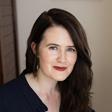From the age of 17, Sarah Clarkson’s imagination has been bombarded by unwanted and disturbing images. She explains how the love of God has been present, even while she has learned to live with Obsessive Compulsive Disorder (OCD)
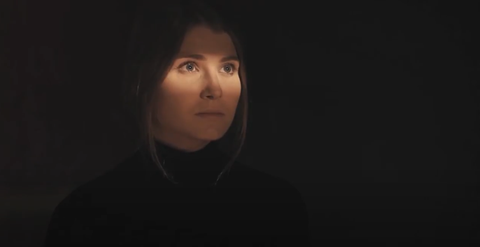
When I was a child, my mind was a gift. That’s where I have to begin. For though my story is ultimately the tale of my mind’s breaking, I believe we are all told two stories about the world; one of beauty, and one of brokenness. After almost 20 years of wrestling with my faith, depression, isolation and grief, I have come to believe that beauty tells the truer story. Beauty created me, beauty has been with me and beauty always calls me forward into healing.
Raised in a Christian family, I believed that beauty was God’s gift to me. As a little girl, I knew the gift of a lavish imagination that filled my inner world with stories and visions of who I could become or what I could create. The glory spilled out right before my eyes and into my ordinary. My world was, as Elizabeth Barrett Browning would say, “crammed with heaven”. Everywhere I looked I saw God’s loveliness.
When I was 17, the nightmare began. There had been warning shots: ugly dreams I admitted to my mother in shame, obsessive guilt and fear over nothing, separation anxiety that bewildered my parents. But the real break happened one autumn morning. I remember the contrast of the cool air of that day with the hot, sticky enclosure of my own imagination, filled with graphic images of violence and sex. Image after image bombarded my inward consciousness. I had no idea where the pictures came from. I couldn’t stop them. I couldn’t look at a person near me, couldn’t feel an emotion without a barrage of disturbing images filling my mind, drawing them into the awful scenes I saw within my imagination. From one day to the next, the self and world I trusted disappeared in the dark presence of a mind that seemed to teem with evil.
I was, eventually, diagnosed with obsessive compulsive disorder (OCD). At first I felt confused; I thought OCD was just being freakish about cleaning. What I discovered was that OCD is a mental illness diagnosed by the presence of intrusive, unwanted and profoundly disturbing thoughts. Now, I would describe OCD as a disease of fear. OCD sees disaster in every corner of the ordinary; car accidents and deadly infections, sexual violence, perversion, house fires and death. The images rise in my brain in such visceral detail that sometimes I tense, waiting for a blow I’ve already imagined. Sometimes I cry, grieving a loss it feels like I’ve already experienced. Compulsions are a way to control the evil, rituals that seem to promise relief. If only I can confess my sin one more time, pray a certain prayer, check the breath of my child, examine the locks or clean the floor, I will keep the destruction at bay.
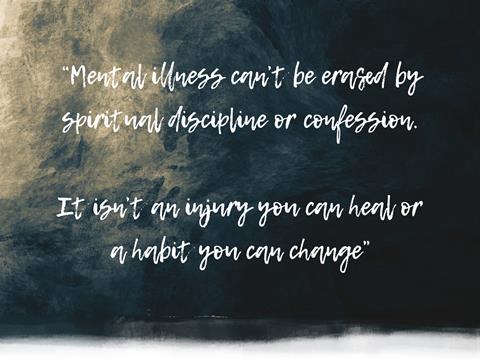
I’ve lived with OCD for 20 years, and it’s taken me almost that long to be able to write about it. In the past year, I’ve published a book about my illness and my faith. My story isn’t ultimately about my darkness; it’s the tale of how God’s beauty broke into my darkness; how God arrived to transform and heal what was most shattered in me.
This journey has brought me to three core truths that now shape the whole of my faith:
I am frail and the world is broken
Before you can know the comedy of the world, you have to admit the tragedy, says author Frederick Buechner, and this was one of the first things I came to know through OCD. I am viscerally aware of my own frailty; the grief and need that is the condition of my faith in a fallen world. I never know when an obsessive image will intrude upon my day, and yet, this frailty has allowed me a clarity of vision that I have learned to welcome. The core, aching truth of the gospel is that it is the only truth that can address our real condition. It is often obscured by our modern ideas of health and success, or by the way the gospel gets presented as an advertising scheme with consumer benefits: believe in God and everything will go your way! Choose faith and you’ll be blessed! With mental illness, I have never had the luxury of thinking that faith would guarantee my ease. Rather – and radically – I’ve come to understand that the gospel describes a God who gave up all ease and dignity in order to restore mine; who gave his world-making heart to be broken so that my mind, body and soul may be made whole.
We live in a world that prizes power, which sees human flourishing in terms of strength, health and a person’s freedom to impose his or her will upon the world. The gospel tells us the true story of power in purity, as it flowed from God. True, holy power is expressed in self-gift, not in domination. Our frailty is not despised or trampled upon by our creator, it is cradled and healed by a power that heals us from the inside out. It does not zap away our frailties (and us with them), but bears them with us.
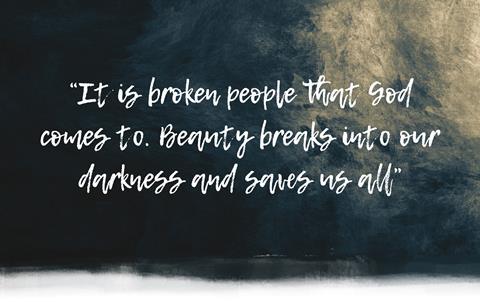
We are not meant to struggle alone
We are souls made one for another, breathed into being by a God who made us for communion. We cannot know health, joy or healing in isolation. One of the great griefs of mental illness is loneliness. OCD is a hidden disease. The dreadful images, compulsions, guilt and fear cannot be seen on my skin. But for years, they quietly undermined friendships, jobs, my desire for university and my attempts at independence. But no one outside my family knew. My shame and incapacity loomed so large in my mind that I couldn’t speak of them. When I finally wrote about my illness, I had friends contact me in grieved surprise: “I wish I had known!”
There is a power in darkness when it is not named. Sin, grief, illness and fear grow monstrous in imagination when they aren’t shared. But when set in the light of another’s knowledge, perspective and love, the dark secrets we bear are often diminished. I thought I was the only one with OCD like mine. But since writing the book, I’ve received countless letters echoing with the strange companionship of those who share the same grief and have found a deep relief. “What, you too?” as CS Lewis said, can be the beginning of profound friendship, and healing.
One of the great beauties I have known in my illness is the God-like love of those who bear my need to confess the horror in my mind. This is a common need for people who have OCD. My mother, my husband and my counsellor are a few of those who give of themselves sacrificially to bear my burden with me. My experience leads me to believe that God is always at work to draw us out from the isolating power of our deepest brokenness into the mending presence of love. Immanuel, God with us, doesn’t mean a sanitised, idealised version of God with us in our power and success, it means God with us in the muck and dirtiness of our worst thoughts, guilt and the fear that haunts our happiest moments. He is here and he is at work.
Beauty will save the world
In the first years of full-on OCD, the wondrous beauty I knew as a child seemed, at times, to mock me. I ached almost unbearably when I remembered the joy of my little girl imagination because it seemed, somehow, to have tricked me. All I could see was ugliness then. All I could feel was loss and, in the midst of that, I found it hard to hold onto any faith in the God of that girlhood; the good and loving one I’d known in the summer fields, in the stories I loved, in the music that made my heart ache with joy.
Until beauty – the same tender, personal beauty I had known as a child – began to break into my despair. I stopped reading my Bible in sheer frustration with my lot, but I started to read The Lord of the Rings and was swept up into a drama of beauty and heroism. The whole of my soul ached for that world. I thought I could no longer take joy in art or music, and then I was given an album of Celtic songs. In listening to it, I felt that the whole of my story was being told in it, and the joy of it summoned me to hope. I was walking one evening, angry and alone, when a bright star broke in like a voice, seeming to offer a whole different view of the world.
I began to realise that there were two stories tugging at my heart; the story of my illness, of grief leading only to despair, and the story of the in breaking beauty, the biblical and epic tale of the God who made the world for goodness and gave himself to redeem it when it was lost. I read the Book of Job and realised that although God never answered Job’s questions, he showed him the splendour of nature and asked him to trust him because of the greatness of the tangible, present beauty of creation; a beauty that became divinely present to us in the person of Christ.
I believe that beauty himself came down into a broken world, into the dark places of my brain, into the aching caves of human suffering, and offered his own presence and life to make us all new. The longer I have walked with OCD, the more I have become aware of God’s tender beauty, embodied in the most ordinary beauty of the everyday, summoning me to hope, to creativity, to life.
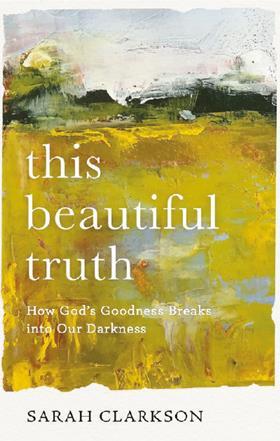
To be a Christian and a person who lives with OCD is a defining tension of my life. Mental illness isn’t something that can be erased in an instant by spiritual discipline or confession. It isn’t an injury you can heal or a habit you can change. It is the physical and spiritual condition of my faith. I can only know and love the living God as a person who bears my broken mind.
And yet, it is precisely to broken people that God comes. Beauty breaks into our darkness and saves us all.
